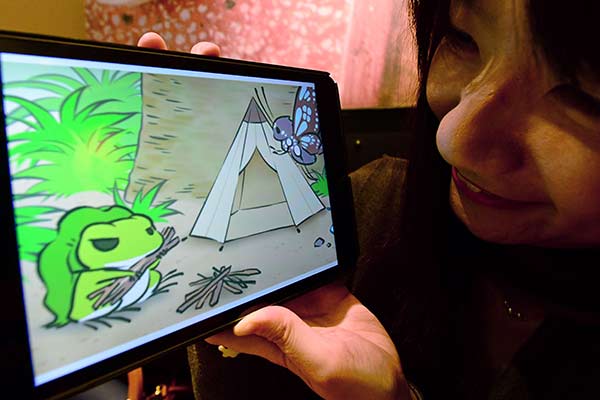Social networking appeals to players


Social networking is gradually becoming a key part of mobile gaming's appeal to the digitally inclined young generation in China, particularly those born in the 1990s and the 2000s.
Recently, the free-roaming Japanese mobile game Travel Frog has attracted a huge following among Chinese netizens by targeting the young generation's specific social and emotional needs.
Developed by the Japanese company Hit-Point, the game only offers a Japanese-language version, but it is easy for Chinese players to break down the language barriers due to its simplicity. In the game, the frog will not talk to or interact with players, who simply watch it living its own life.
Jessica Zheng, a 25-year-old editor based in Beijing, started playing the game this January, as lots of her friends shared the game on Tencent's messaging app WeChat platform.
"I really look forward to receiving special postcards from the frog," Zheng said. "The game is a really good way to stay in touch with my friends, as we will share experiences with each other both online and offline."
Mobile analytics company App Annie reported that Travel Frog topped the list of the most downloaded iOS apps in China in January this year. From its release last December to January 28 this year, the game was downloaded 3.9 million times in the country and Chinese players spent more than $2 million on in-app purchases for the game.
Kern Zhang, senior account manager at App Annie China, said the booming mobile internet has made it easier for developers to cater to young game players' growing emotional and social needs.
"The detailed game graphics activate players' natural desire to share. And mobile games like Travel Frog just meet young people's sharing of feelings on the social networking site," Zhang added.
According to Zhang, it will still take some time to grow the market, and other similar mobile games can be expected to pop up in the future.
Seeing this new trend, a wide range of game companies has joined the army to target the digital young generation.
Tencent Holdings Ltd's popular mobile role-paying game King of Glory defeated all other iOS apps in China to take the top spot in income generation in January this year, according to App Annie.
The rise has been fueled by millennials and those born after the 1990s. A report by Chinese mobile data intelligence firm Jiguang showed that more than two-thirds of the players are younger than 29.
Data from Gamma Data Corp pointed out in a recent report that King of Glory offers a platform for entertainment and communication and thus makes the smartphone phenomena a worldwide hit. App Annie reported that King of Glory ranked in third place globally for monthly revenue in January on the App Store.
In 2017, mobile gaming accounted for 57 percent of the total game sales and reached 116.1 billion yuan ($18.4 billion) in China, according to a survey by the Game Publishers Association Publications Committee of the China Audio-video and Digital Publishing Association, Gamma Data Corp and International Data Corporation.
Currently, China is home to a total of 554 million mobile gaming players, and the group will gradually involve more post-1990s and post-2000s generations.
- App makers offer millions - let the games begin
- Tencent, Lego partner to create digital entertainment experience for Chinese children
- Cutting-edge innovation affects every walk of life
- Tencent's new investment plan will boost content creators
- Pilot program aims to protect young netizens from dangers of cyberfraud




































